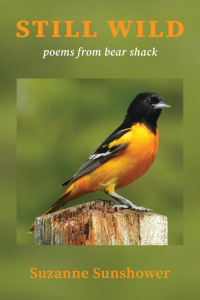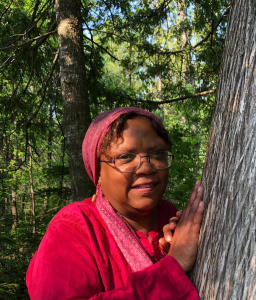Emma Palova interviews Suzanne Sunshower
Click on the triangle below to start listening
 At sixty, after a string of losses and a lifetime of making art and words, I did the impulsive, crazy thing: I moved into a 50-year-old hunting camper tucked away in the Michigan woods. I call it Bear Shack. Still Wild is the book that grew from that move — a collection of poems and reflections on grief, aging, nature, forgiveness, and what it means to become a full-time Yooper in Michigan’s Upper Peninsula.
At sixty, after a string of losses and a lifetime of making art and words, I did the impulsive, crazy thing: I moved into a 50-year-old hunting camper tucked away in the Michigan woods. I call it Bear Shack. Still Wild is the book that grew from that move — a collection of poems and reflections on grief, aging, nature, forgiveness, and what it means to become a full-time Yooper in Michigan’s Upper Peninsula.
How I Found Bear Shack
I had been looking for a place I could afford up north and joking to realtors that, if not for my aging cat, I would just live in a van in the woods. When my cat passed away just before his 19th birthday, I saw an ad for a camper 205 miles away. I drove up, peered through frozen windows, and felt — in that instant — that it was meant to be. I bought it and moved in on Halloween 2022. The camper had never been lived in; it had been used only as a hunting camp. It was grungy, old, and full of surprises. I also brought a new puppy with me. Life, it seemed, was asking for a big adventure.
Why I Wrote Still Wild
Living in Bear Shack demanded adjustments I had not anticipated: no running water I could use, unexpected holes, and all the practical ways human life intrudes on glorious solitude. But mostly I wrote because this place asked for it. The woods became both a literal home and a metaphorical landscape for grief, memory, and renewal.
Shortly after I moved in, I began writing poems. In 2023, Modern History Press launched their Yooper poetry series, and when they asked if I was working on a full book, I said yes. By then, I had lived in the woods for a year and was officially a Yooper. The manuscript that became Still Wild grew out of that urgency to honor the spirits of the place and the people I had lost.
The Themes: Grief, Forgiveness, and the Wild
 Still Wild is not just about Bear Shack. It is about ongoing discovery and adjustment. The woods are a backdrop and a lens. Moving away from friends and family did not stop life from happening. While I was up north, my closest friend in Detroit died of cancer, and he appears in the book. The poems move between the practicalities of living off-grid and the interior work of forgiving myself and others, learning Zen-like patience, and falling in love — not with the camper, but with the spot, the trees, the birds, and the rhythms of wildlife.
Still Wild is not just about Bear Shack. It is about ongoing discovery and adjustment. The woods are a backdrop and a lens. Moving away from friends and family did not stop life from happening. While I was up north, my closest friend in Detroit died of cancer, and he appears in the book. The poems move between the practicalities of living off-grid and the interior work of forgiving myself and others, learning Zen-like patience, and falling in love — not with the camper, but with the spot, the trees, the birds, and the rhythms of wildlife.
Grief and the Idea of Conquering
My approach to grief has always been to find something big and conquer it. For me that meant this move, this experiment in living older and wilder. That impulse to take on a big, living challenge is part survival, part creative spark. It kept me focused and proved that creativity and productivity do not have an expiration date.
Challenges, Surprises, and Epiphanies
Practically speaking, Bear Shack demanded a lot: repairing plumbing I could not turn on, dealing with old possessions left behind, and getting used to being far from town. At times the nearest town was 30 miles away due to construction; normally it is about 10 miles to Rudyard. Isolation is part of the bargain. You do feel lonely sometimes, but you find ways to manage, and the dog helps.
Some surprises were more bizarre than dangerous. I worried about bears but was startled when religious visitors started knocking on my door in the woods. I had not expected that. There were other, quieter epiphanies: forgiveness arrived as an unplanned, sudden moment in the middle of my life here. It required being open to it, not just waiting for it to happen.
Poems and Voices from Bear Shack
The poems in Still Wild move between elegy and observation. They honor the animals and people, celebrate the fall light and the stubbornness of trees, and sometimes ask simple, human questions about love and memory. A few images that recur:
- The late autumn blaze of red and orange across the Michigan sky, remembered as a halo and a comfort.
- The rhythm of a woodpecker at work, reminding me of the fragility of human hearts and the force of nature.
- Spirit mounds and the bones scattered in the woods, where life and death are in constant conversation.
“What happens here stays here. Earthen mound, haunted by gnashing teeth and picked bones lying still, but never active horror.”
“I released you as best as a loved one can when the last leaves began to fall.”
These lines show how intimacy with landscape can become a form of mourning and of memorializing. The poems are personal but also open to any reader who has lived through loss and found refuge in place.
What I Learned About Myself
Writing Still Wild taught me a few key things:
- I can still focus and meet deadlines. Creativity did not dry up at sixty.
- I am capable of being productive and producing work that matters to me.
- Age and an aging dwelling taught me a fresh perspective. Living among elder trees in an old camp helped me celebrate being “old, but still amazing.”
One practical lesson: I probably would not have moved all the old, heavy stuff from the camp. But I would not change the move itself. Falling in love with this place, and with the process of growing older here, has been more important than any material inconvenience.
Gratifying Moments and Little Joys
The most gratifying part of publishing Still Wild has been remembering how deeply I fell for the place — the birds, the squirrels, the rhythms of the land. It is also a love story for new companions like my dog, Princess Momo, and the spirit of my late cat, Steppenwolf, who became part of the book.
I love the small, human moments that keep authorship rich: surprising an old friend at their book reading, the shared recognition that two kids who passed notes in eighth grade grew up to be writers. Those moments make all the solitude worthwhile.
Takeaways and Advice
Here are some of the takeaways I hope readers carry with them:
- Remain spirited. Keep your inner light lit.
- Always stay a little wild. A spark of wildness keeps life vibrant.
- Keep creating. Age is not the end of productivity.
- Write indie, buy indie, read indie. Support local writers and independent presses.
- Keep your fingers on the keyboard and your butt in the chair. Discipline matters.
Find something big and conquer it. That is my guiding motto for moving through grief and finding purpose.
Book Giveaway and Events
I am giving away a softcover copy of Still Wild. If you would like to enter, you can contact me through my website: SuzanneSunshower.com. My contact information is there for sending an address for the giveaway.
Upcoming public appearances and book launch events:
- St. Ignace Library book launch: December 7 at 3:00 PM.
- Peter White Public Library, Marquette: December 9 at 6:30 PM.
Check my website for full details and updates.
What Comes Next
After poetry I want to dive into fiction. I am thinking about a thriller set in the woods of the Upper Peninsula — something where the landscape itself becomes a character. The idea is still jelling, but my next book will be fiction born from the same wild place that inspired Still Wild.
Parting Words
Remain spirited and always stay a little wild. That balance keeps a life in the woods from being lonely and keeps a life elsewhere from becoming tame. Thank you for reading. If Bear Shack has taught me anything, it is that grief and love can share the same sky, and that even at sixty you can begin a new adventure and still be amazed by what you find.





I loved reading about your creative process and I’m excited to check out your book release party tomorrow! Take care.